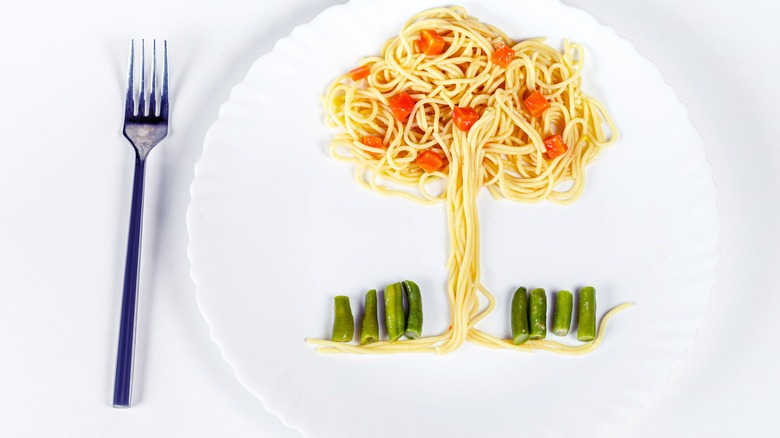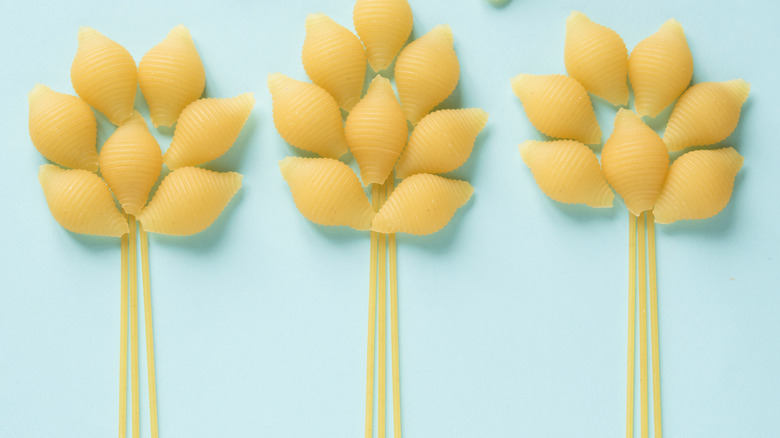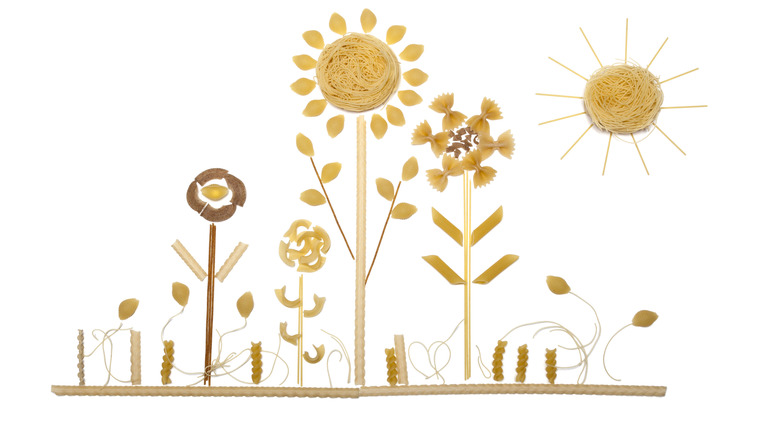The Hilarious Reason People Once Thought Pasta Grew On Trees
While "fake news" has become a catchphrase in recent years that may lead you to either cringe or chuckle, the BBC may take the cake for the best fake news segment. In 1957, the broadcaster "punk'd" an entire nation on April Fools' Day. The broadcast television service fooled British viewers into believing that spaghetti grows on trees after airing a nearly three-minute segment on its Panorama current-affairs program that became known as "The Spaghetti Harvest" hoax.
It all started with Charles de Jaeger, a cameraman for Panorama. According to Ars Technica, he said that growing up, his teacher used to say to him and his fellow students, "Boys, you're so stupid, you'd believe me if I told you that spaghetti grows on trees." In 1957, de Jaeger used this memory as inspiration and — on a 100-pound budget — began filming footage in Switzerland that would later fool a U.K. audience on April 1.
With the go-ahead from Michael Peacock, an editor at Panorama, the cameraman headed to Castiglione in the Italian part of Switzerland, where he purchased a lot of spaghetti. He then arranged the pasta so that trees in the area actually appeared to be sprouting it. In the footage, the program's anchor begins with, "But what, you may ask, has the early and welcome arrival of bees and blossom to do with food? ... It's resulted in an exceptionally heavy spaghetti crop."
The spaghetti grows on trees hoax
The prank didn't end there. Charles de Jaeger got women in the area to wear traditional Swiss clothing and act as if they were taking the spaghetti off each tree to collect it. The anchor continues, "Many people are often puzzled by the fact that spaghetti is produced at such uniform length, but this is the result of many years of patient endeavor by plant breeders, who have succeeded in producing the perfect spaghetti." Unsuspecting viewers were none the wiser that Richard Dimbleby, the anchor for Panorama, was pulling their leg.
The BBC was busy taking calls that night. Ars Technica reports that Leonard Miall from the BBC said, "Mainly the calls were requests for the BBC to settle family arguments: the husband knew it must be true that spaghetti grew on a bush because Richard Dimbleby had said so, and the wife knew it was made with flour and water, but neither could convince the other." Other callers asked if they could purchase a spaghetti tree. Responders were told to say, "Place a sprig of spaghetti in a tin of tomato sauce and hope for the best."
How the spaghetti hoax tricked viewers
According to Ars Technica, Sir Ian Jacob, an executive for BBC, was also fooled and shared with Charles de Jaegar, "The spaghetti harvest was a splendid idea, beautifully shot and organized." The brief clip led to some controversy, but David Wheeler, a Panorama producer, told BBC News, "I think it was a good idea for people to be aware they couldn't believe everything they saw on the television and that they ought to adopt a slightly critical attitude to it."
Other highlights include the anchor stating, "Spaghetti cultivation here in Switzerland is not, of course, carried out on anything like the tremendous scale of the Italian industry. Many of you, I'm sure, will have seen pictures of the vast spaghetti plantations in the Po Valley. For the Swiss, however, it tends to be more of a family affair." Later, as actors enjoy their spaghetti dinner, the anchor adds, "And now, the harvest is marked by a traditional meal. ... For those who love this dish, there's nothing like real homegrown spaghetti."
Although today, we have dishes ranging from spaghetti carbonara to spaghetti with clam sauce, if you're wondering how an audience believed this hoax, spaghetti was not popular in the U.K. at the time. But this April 1, if you see swarms of people climbing trees, double-check whether the BBC has aired any new segments about money growing on trees.


